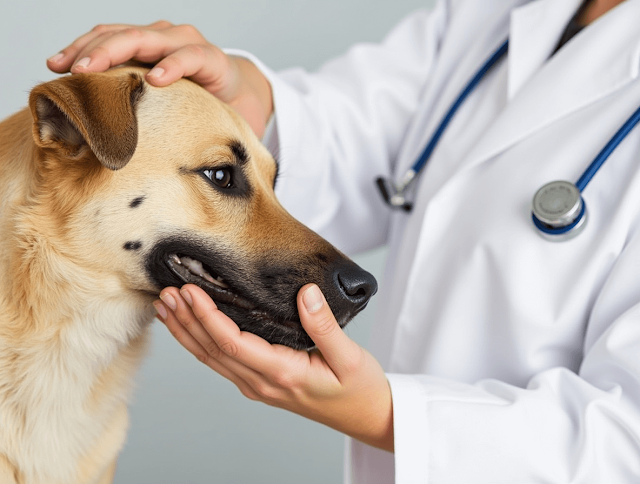Is Your Dog at Risk of Canine Respiratory Disease?
Is Your Dog at Risk of Canine Respiratory Disease?
 |
| Learn the signs and risks of canine respiratory disease. Protect your dog with early detection and preventative care. |
Discover how to identify early signs of canine respiratory disease. Take proactive steps to safeguard your dog’s respiratory health today.
Introduction
Your dog’s health and well-being rely heavily on your ability to recognize and respond to potential risks. Canine respiratory disease is a threat that can compromise your furry companion's quality of life if left unchecked. Gaining a thorough understanding of respiratory health is crucial for every dog owner, from understanding the causes to recognizing the symptoms and implementing preventive measures.
Understanding Canine Respiratory Disease
 |
| Learn about canine respiratory disease, its causes, and symptoms. Early awareness ensures better health for your dog. |
What is Canine Respiratory Disease?
Canine respiratory disease encompasses a range of conditions that affect the respiratory system, including the nose, throat, trachea, and lungs. These ailments can vary in severity, from mild infections like kennel cough to more severe conditions such as pneumonia or chronic bronchitis. Each case impacts a dog’s ability to breathe, and timely intervention is essential to avoid complications.
Common Types of Respiratory Diseases in Dogs
- Kennel Cough (Canine Infectious Tracheobronchitis): Highly contagious and characterized by a persistent, hacking cough.
- Canine Influenza Virus: Similar to human flu, causing fever, lethargy, and respiratory distress.
- Pneumonia: A serious condition where lung inflammation leads to difficulty breathing.
- Chronic Bronchitis: Persistent inflammation of the airways, often seen in older dogs.
Why Awareness of Respiratory Issues is Crucial
Awareness empowers prevention. Left untreated, respiratory diseases can escalate into life-threatening conditions. By recognizing potential risks early, you can safeguard your dog’s health swiftly.
Signs and Symptoms to Watch For
Early Warning Signs of Respiratory Trouble
 |
| Recognize signs of canine respiratory disease, like coughing and lethargy. Early detection is key to effective treatment. |
Common signs include coughing, wheezing, nasal discharge, and labored breathing. You might also notice lethargy, loss of appetite, or an unusual posture where your dog extends its neck to ease breathing.
When to Seek Veterinary Assistance
Seek immediate veterinary attention if your dog shows signs of severe distress, such as blue gums (indicating oxygen deprivation), rapid breathing, or fainting episodes. Early diagnosis can make all the difference.
Differentiating Respiratory Disease Symptoms from Other Illnesses
Symptoms like coughing or sneezing can overlap with allergies or minor infections. A professional evaluation is vital to pinpoint the cause and administer the right treatment.
Risk Factors for Canine Respiratory Disease
 |
| Crowded spaces, age, and breed can increase your dog’s risk of respiratory disease. Learn how to protect them. |
Breed-Specific Vulnerabilities and Susceptibilities
Some breeds, particularly brachycephalic dogs like Bulldogs and Pugs, are predisposed to respiratory issues due to their shortened airways. Large breeds, such as Great Danes, may face unique challenges, including laryngeal paralysis.
Age and Immune System Considerations
Puppies and senior dogs are more vulnerable due to their underdeveloped or weakened immune systems. Puppies are prone to infections, while older dogs are at risk of chronic conditions.
Environmental Triggers and Lifestyle Factors
Exposure to smoke, dust, or poor ventilation can exacerbate respiratory issues. Dogs in crowded or unhygienic environments, such as shelters or kennels, face a higher risk of contracting infectious diseases.
Preventing Canine Respiratory Disease
 |
| Keep your dog safe with proper hygiene, vaccinations, and a healthy environment. Prevention is the best protection! |
Vaccinations: A Critical Line of Defense
Vaccines, such as those for kennel cough and canine influenza, are pivotal in prevention. Ensure your dog’s vaccinations are current, especially if they frequent high-risk areas like dog parks or boarding facilities.
Maintaining a Clean and Healthy Environment
Regularly clean your dog’s bedding, toys, and living space to minimize exposure to harmful pathogens. Fresh air and proper ventilation are equally important for respiratory health.
Tips for Reducing Exposure to Common Pathogens
Avoid crowded areas during outbreaks and limit contact with other dogs if you show any signs of illness. Proper hygiene practices, such as washing your hands after handling other animals, can also reduce risks.
Diagnosing and Treating Respiratory Disease in Dogs
 |
| Early diagnosis and proper treatment can save your dog’s life. Learn the steps to address respiratory diseases effectively. |
How Veterinarians Diagnose Respiratory Conditions
Diagnosis typically involves a combination of physical exams, imaging (like X-rays), and laboratory tests. Vets may also perform bronchoscopy or collect samples for further analysis.
Treatment Options: Medications, Therapies, and Lifestyle Adjustments
Treatment depends on the condition but may include antibiotics, anti-inflammatory drugs, or bronchodilators. Severe cases might require oxygen therapy or even surgery.
Recovery Tips and How to Support Your Dog’s Health
Provide a calm, stress-free environment during recovery. Ensure your dog gets plenty of rest, stays hydrated, and adheres to prescribed medications or therapies.
Steps to Protect Your Dog’s Respiratory Health
 |
| Ensure your dog’s respiratory health with vaccinations, hygiene, and vet visits. Prevention is key to their well-being. |
Building a Robust Immune System Through Nutrition and Exercise
A balanced diet rich in essential nutrients and regular physical activity can strengthen your dog’s immune system. Discuss dietary supplements with your vet if needed.
Regular Checkups to Catch Problems Early
Routine veterinary visits allow for early detection of respiratory issues and other health concerns. Preventive care is key to long-term well-being.
Creating a Safe and Comfortable Home Environment
Ensure your home is free from irritants like cigarette smoke or harsh cleaning chemicals. Provide a cozy space where your dog feels secure and can relax.
Conclusion
The Importance of Vigilance in Protecting Your Dog
Your dog depends on you to recognize subtle signs of illness and take proactive steps. Vigilance can prevent minor issues from becoming major health crises.
Encouragement to Act Quickly When Signs Appear
Time is of the essence. Prompt action can mean the difference between a quick recovery and prolonged suffering.
Final Thoughts on Ensuring a Long, Healthy Life for Your Pet
You can give your dog the gift of good health and a happy, fulfilling life by staying informed and attentive. Their well-being is a reflection of your care and commitment.






